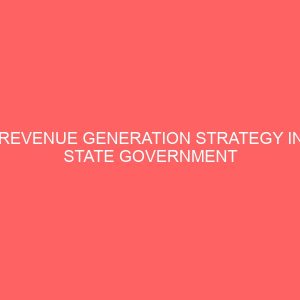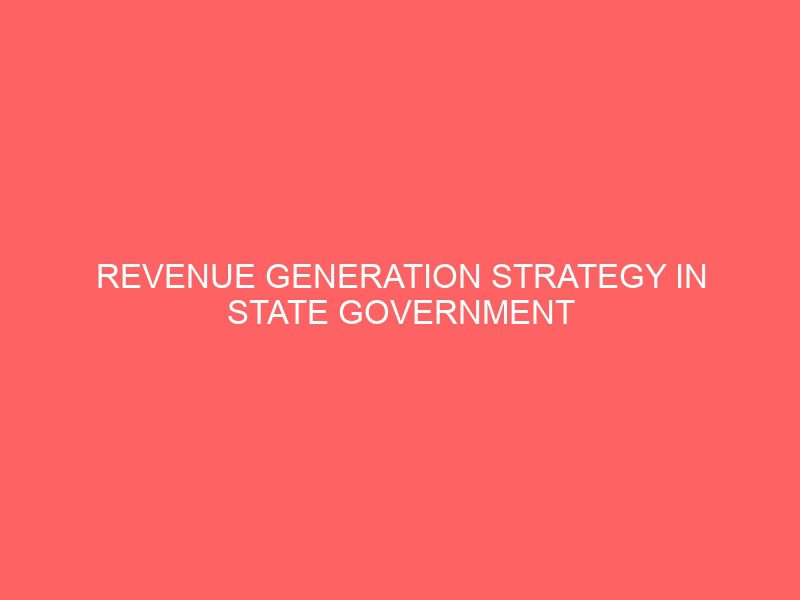Description
ABSTRACT
Revenue generation is a major source of income to Nigeria and the States in general, even though itis said to be dwindling due to weak controls in the systems of revenue generation and workersattitude. The objective of the study includes examining how the application of strategic control andthe balanced scorecard can transform the attitude of workers with a view to enhancing overallorganization goal. It highlights the requirements of IAS 18 on revenue recognition. The study isdescriptive and adopted the desk research approach, using secondary sources of data such asjournals, textbooks, accounting standards, government papers. The study found that there is needfor reengineering the whole system through strategic controls and using the balanced scorecard asan appraisal system for staff performance which when properly linked with organization objectivewill enhance increased revenue generation. The study concludes that the performance appraisalsystem currently in use is counter productive and subject to abuse thus, it should give way to theuse of the balanced scorecard which is goaldirected.
INTRODUCTION
Strategies are designed as a means of achieving desired goals and objectives. Due to thevast rate of technological developments, the use of strategies has become crucial to attainingobjectives. Hofer Schendel 1979, defined strategy as the mediating force between theorganization and the environment. When linked to the process of management, it is viewedas organized development of the resources of the functional areas such as revenue service,marketing, manufacturing etc in pursuit of its objectives. From the foregoing, strategy as ameans of achieving set objectives, its link to revenue generation service require strategicallylaying plans that will move from general to specific with a view to executing the real intentof revenue generation effort particularly in the Local Government system and in publicsector in general . Strategies are plans directed at achieving specific organization goals ofthe organization. Revenue generation is the main source of income to the Federal, State andlocal Governments. Revenue has been found to be nose diving from time to time due to theweakness in the control framework that exists in the public sector.
To address this problem, requires proper implementation of plans directed at enhancingadequate revenue generation. IFRS 18, recommends that revenue recognition is dependentupon the terms of the contract between the entity and the buyer of goods, the recipient of theArabian Journal of Business and Management Review Nigerian Chapter Vol. 1, No. 10, 201325
services or the users of the assets of the entity. Revenue should be measured at the fair valueof the consideration receivable or received net of any trade discounts and volume of rebatesgiven by the entity. The International Accounting Standards Board IASBs frameworkstipulates that revenue is to be recognized when it is probable that future economic benefitswill flow to the entity and reliable measure of the quantum of revenue is measurable. Thefollowing applicable strategies for revenue generation have always been very helpful
Planning of the available resources such as personnel, mobility etc.
Framework of revenue collection from internal to external coverage in order tomaximise collection of revenue with minimum input.
Framework to safeguard revenue collected up to designated account.
The aim of revenue generation as laid down by the Federal Government is incomegeneration through personal and income taxes, adverts or billboard, business premiseregistration among others. Due to the wideness of the revenue sources, tactical plans areneeded to get grip of harnessing resources to enable collection, and reduction or eliminationof tax avoidance and evasion. In order to affect plans for the organization, the area of focushas always been finance in which costs of production, selling and distribution, wages andmaintenance have been emphasised especially in the manufacturing and profit makingventures. In the public sector the goal setting focuses on services to be rendered, which willtranslate to timely completion of individual schedules to converge in the annual financialstatement to be produced. The Internal Revenue department is the income generating organfor the state and is faced with the herculean task of collecting taxes in various formspersonal income tax, company tax, registration of vehicles, among others from the public.According to Norton Kaplan 2012, the finance focus is not enough to effectivelyhandle the diverse types of revenue to be collected. Even though the financial health of anorganization is essential, there are other interrelated factors which are necessary for success.Strategic plans aimed at achieving organization goals should consider the satisfaction ofeveryone that is connected to achieving the revenue collection goal. Hence improving theapproach to the task requires setting of goals, which has to do with the quality of service,income generation mix along with other drivers directed at attaining organization goals. Inline with this, a tool to cater for better measures of the organizations capabilities that willcreate long term value by identifying relevant key drivers such as customers, financial andoperational plans, innovativeness etc. is the balanced scorecard.
The effect of the wider focus is to give room to measures that indicate the organizationstrategies, implementation and execution that enhance goals and yield improvement in thestatus quo. Interaction between each of these critical organization functions can be resultoriented under a framework of controls that are instituted to serve as guide for every actionand also as a means of attaining checks and balances. The control function emanates fromtop to bottom that is horizontal and in between each functional staff, that is vertical. In thepublic service, the line of authority is from top to bottom and as such topdown controlsubsists for organization functions. Internal control, according to Hassan 2001 is definedas the whole system of controls financial or otherwise, established by management in anorderly manner to safeguard its assets, and secure as far as possible the accuracy andreliability of its records. By public service is meant establishments that are directly underArabian Journal of Business and Management Review Nigerian Chapter Vol. 1, No. 10, 201326
The umbrella of the government at federal, state or local government area. This may be asParastatals or as Ministry and the Ministry exists as a subsystem of the overallorganization. According to Fletcher 2004, the application of the Balanced ScorecardBSC could also present as strategising in the use of available resources such as humanmanpower, finances and other resources to attain set goals.








Reviews
There are no reviews yet.